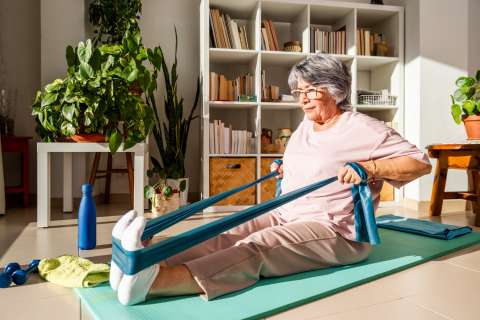UCLA Health is one of 75 sites around the globe participating in a clinical trial sponsored by the National Institutes of Health to test the effectiveness of a candidate anti-viral drug against COVID-19.
The drug, called remdesivir, was originally developed as a treatment for Ebolavirus. Although found to be safe, it was not effective in treating those patients. However, in laboratory tests it appears to work against the SARS-CoV-2, which causes COVID-19, raising hope for its efficacy against this new, novel virus that has swept the globe, sickening and killing thousands. At its worst, the disease attacks the lung in particularly vulnerable people. People age 60 and older who have other health issues are especially susceptible to the disease's most severe effects and are likeliest to die from it.
This evidence has initiated formal investigations into the efficacy of the drug such as the one launched by the NIH through its National Institute of Allergy and Infectious Diseases. UCLA, an academic medical center at the forefront of health research, is part of this and trials of other drugs to fight the virus – with others potentially launching soon.
Dr. Otto Yang, professor of medicine, division of infectious diseases, at the David Geffen School of Medicine at UCLA, is leading this trial, with substantial support from the UCLA Clinical and Translational Science Institute.
"Remdesivir is a drug that has good activity against the virus in lab experiments, and it seems to effectively treat similar viruses in animals," said Yang, who is also a professor of microbiology, immunology & molecular genetics at the Geffen School. "We don't know yet whether it is effective in humans with COVID-19 so it is undergoing clinical tests in patients."
There are a few big trials underway in China and the U.S. combining data from many patients at various medical facilities, with UCLA being one of the sites for one of the biggest trials, he noted. Patients are offered enrollment if they have known COVID-19, are admitted to the hospital and have moderate or worse illness. The trial is placebo-controlled, meaning that half of patients get the actual drug and half get a placebo, or substance that has no therapeutic effect. It is also double-blind, meaning that the researchers do not know which patients are getting the drug or placebo, thus preventing any intentional or unintentional bias.
Placebo-controlled trials are necessary to maintain the integrity of the findings. And it is important to note that there are now no known effective treatments against COVID-19, Yang said. Participants who receive the placebo are contributing as much to the fight against COVID-19 as those getting the actual drug.
"So, participating in a trial is really about figuring out what might work, and it is a valuable contribution to helping science and developing useful treatments for the future," Yang said. "Receiving the placebo is just as important as receiving the drug from this standpoint, when we don't know if an experimental treatment has a benefit at all."
This is only one of several trials of different agents under investigation at UCLA to use against the disease, said Dr. Judith Currier, chief of the UCLA Division of Infectious Diseases at the Geffen School.
Currier and Dr. Arash Naeim, chief medical officer for clinical research for UCLA Health, are co-chairs of a clinical research task force that is coordinating these studies across multiple units on campus, such as the UCLA Clinical and Translational Science Institute and the UCLA Fielding School of Public Health.
For instance, one trial is examining sarilumab, a treatment for rheumatoid arthritis.
"There are several more trials expected soon as we work to evaluate promising therapies including biologics, antivirals and immune-based treatments for people with different stages of COVID disease," Currier said.



